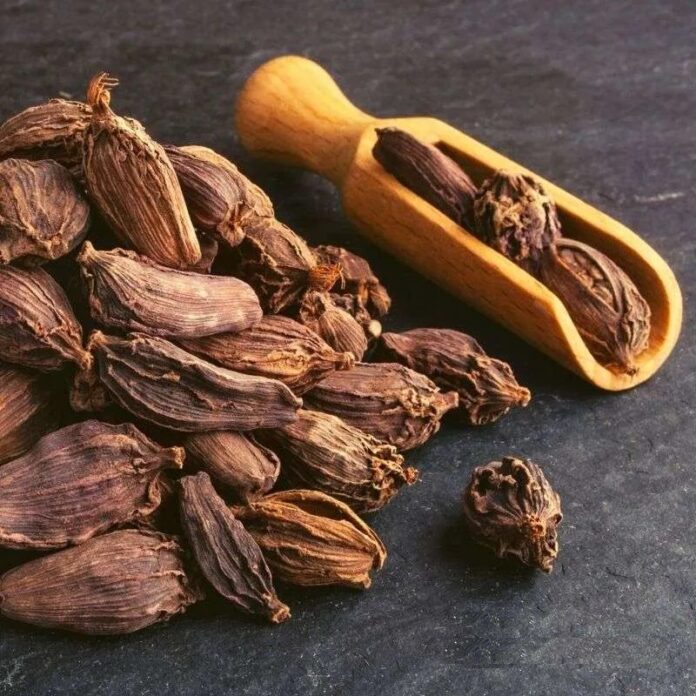What is Cardamom?
Cardamom is a spice derived from the seeds of plants in the Zingiberaceae family, primarily from the genera Elettaria and Amomum. It is known for its aromatic and flavorful seeds, which can be used whole or ground into a powder.
Types
There are several types of cardamom, including black cardamom. Here are the main types:
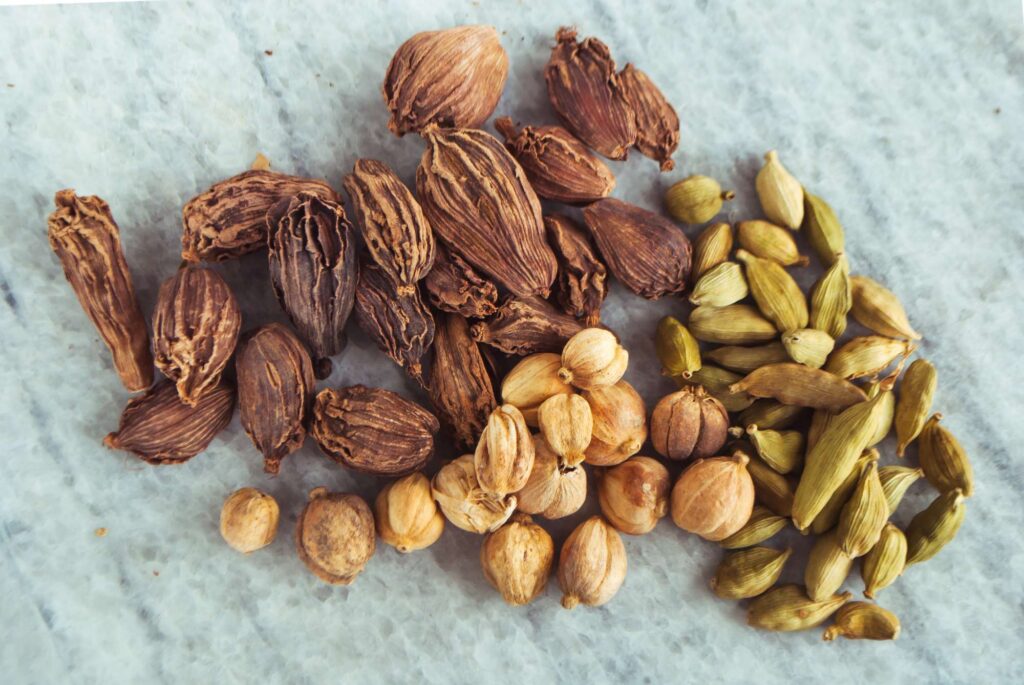
- Black Cardamom (Amomum subulatum): Characterized by its large, dark brown to black pods with a smoky flavor. It is commonly used in Indian and Asian cuisines.
- Green Cardamom (Elettaria cardamomum): The most commonly used type, with small, green pods that have a sweet, aromatic flavor. It is used in both savory and sweet dishes and is a key ingredient in chai.
- White Cardamom: This is bleached green cardamom, which has a milder flavor. It is often used in Chinese cooking and desserts.
- Java Cardamom (Amomum compactum): Similar to black cardamom but with a slightly different flavor profile. It is used in some Southeast Asian cuisines.
- Borneo Cardamom (Amomum Tsao-ko): Found primarily in Southeast Asia, this type has a strong aroma and is often used in traditional dishes.
- Hill Cardamom (Amomum villosum): Grown in the hilly regions of Southeast Asia, it has a unique flavor and is used in regional cuisines.
What Is Black Cardamom?
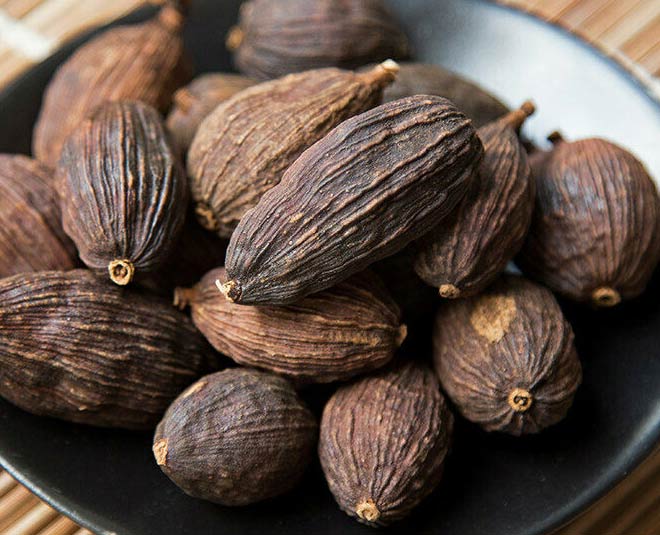
Amomum subulate is the scientific name for black cardamom. It develops in a pod on the herbaceous plants from the Zingiberaceae (ginger) family. The pods are about an inch long, with a thick, wrinkled, dry exterior that contains tiny, sticky, dark-colored seeds. Black cardamon has a strong flavour of citrus and eucalyptus and a strong fragrance.
Forms
Black cardamom can be found and used in various forms, including:
- Whole Pods: The dried pods can be used as they are in cooking, imparting a smoky flavor to dishes.
- Ground Powder: The dried pods can be ground into a fine powder for use in spice blends, marinades, and seasoning.
- Crushed Seeds: The seeds can be extracted from the pods and used directly in cooking or ground for flavor.
- Infused Oil: Black cardamom oil can be extracted and used for cooking or as a flavoring agent.
- Tea: Black cardamom can be brewed as a tea, either on its own or combined with other spices and herbs.
- Spice Blends: It is often included in various spice blends, such as garam masala or chai masala, for added flavor and aroma.
Health Benefits
Black cardamom (Amomum subulatum) offers several potential health benefits due to its unique compounds and nutrients. Here are some of the key benefits:
Good for Liver Health
Some studies have shown that black cardamom can have positive effects on your liver. Studies have shown that black cardamom can help remove toxins from the body, which can be beneficial for the liver.
Promotes Heart Health
Black cardamom is believed to be heart-healthy and can help protect your cardiac health. It helps maintain your heart rhythm which will help assist in keeping your blood pressure levels under control, thus reducing the risk of heart health. It lowers the risk of blood clots, heat exhaustion and stroke.
Good for Digestion
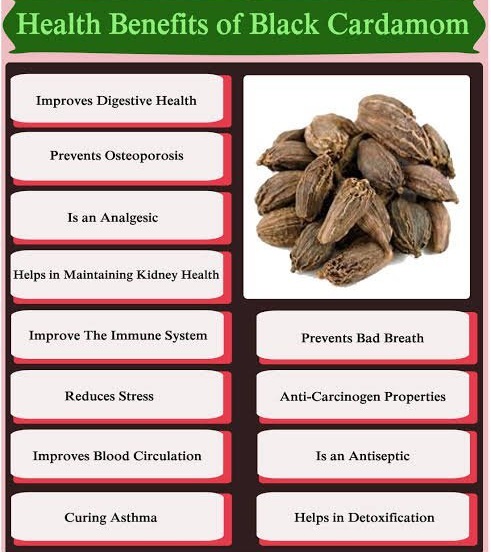
Have you been experiencing digestive problems? If yes, black cardamom helps ease digestive problems by fighting stomach ulcers. Additionally, it enhances your appetite and supports heart health. Additionally, it prevents problems with gas and bloating.
Improves Urinary Health
Another benefit of having black cardamom is that it works as a diuretic. It can facilitate urination by keeping your renal system healthy. It can also reduce the risk of urinary infections by blocking the growth of bacteria.
May Reduce Cancer Risk
Some studies have shown that black cardamon contains two phytochemicals, namely Diindolylmethane and Indole-3-Carbinol, that may help control the onset of ovarian, breast and ovarian cancer. A study published in the Journal of Medicinal Food found that cardamom reduced the size and weight of skin tumors in mice.
Relieves Pain
Black cardamom oil has sedative and anesthetic properties. It might stop throbbing pain, such as a headache, and give instant relief. Stress and weariness are also eliminated with the spice’s essential oil.
Offers Skin Benefits
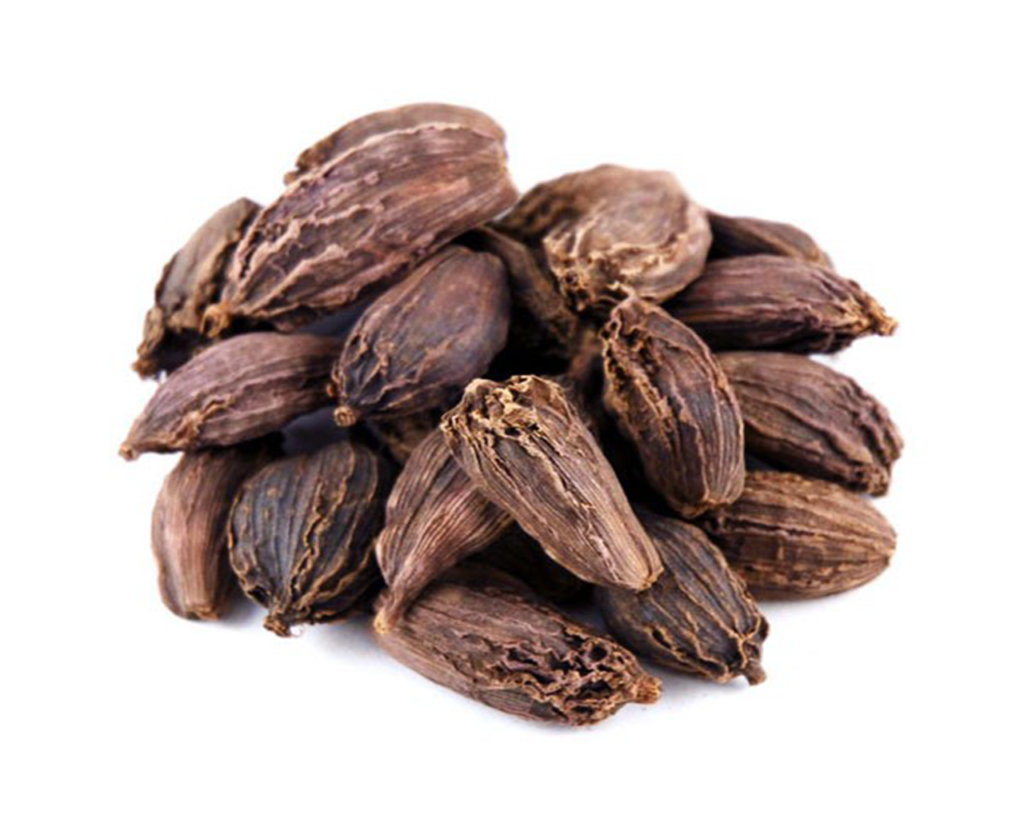
Consuming black cardamom is beneficial for maintaining healthy skin. It functions as both an antioxidant and an antimicrobial. Additionally, it has a lot of vitamin C, which is necessary to produce collagen, the protein that gives our skin its suppleness and elasticity. Black cardamom’s combination of ingredients makes it easier for the body to remove toxins while also promoting blood circulation.
Hair Benefits
Consuming black cardamom might help you have good skin. It has antibacterial and antioxidant properties. It also contains a lot of vitamin C, which is important for the synthesis of collagen, the protein responsible for the suppleness and elasticity of our skin. The mixture of components in black cardamom facilitates the body’s toxins removal while also enhancing blood circulation.
Side Effects
While black cardamom (Amomum subulatum) is generally safe for most people when used in culinary amounts, it can have some side effects, particularly if consumed in excessive amounts. Here are some potential side effects:

- Allergic Reactions
- Digestive Issues
- Hypoglycemia
- Pregnancy Concerns
- Interactions with Medications
- Heartburn or Acid Reflux
- Potential Hormonal Effects



